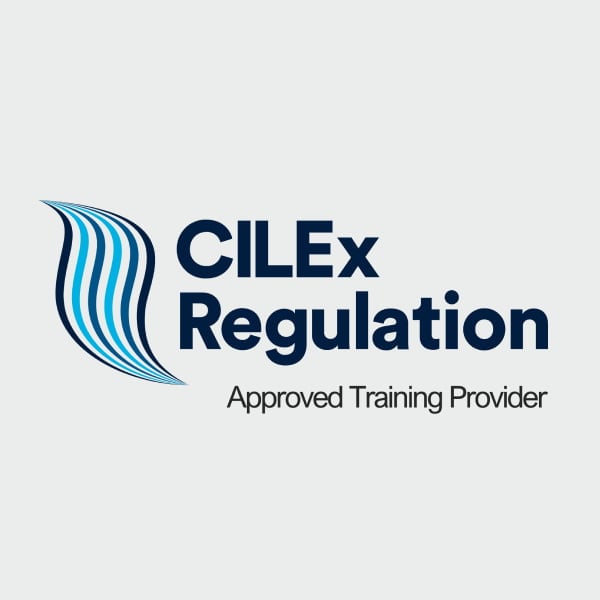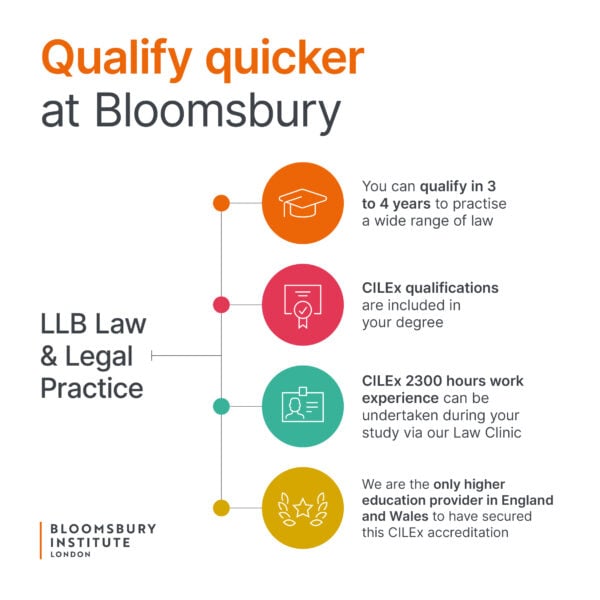Uniquely, graduates from Bloomsbury Institute’s LLB Law and Legal Practice course also meet CILEx Regulation standards, but how does this help you qualify quicker?
What is CILEx?
The Chartered Institute of Legal Executives (CILEx) is the professional body for CILEx legal professionals. There are over 17,500 members of CILEx, including 7,000 practising legal executives in England and Wales.
Chartered Legal Executives are qualified legal professionals that specialise in particular areas of law. They can practice independently or within law firms.
Chartered Legal Executives are regulated by CILEx Regulation Ltd who set the professional standards that Chartered Legal Executives must meet and can take action where a Chartered Legal Executive’s conduct falls below those standards. CILEx Regulation Ltd also sets the parameters for qualification as a Chartered Legal Executive.
The CILEx Professional Qualification (CPQ) is the usual route to qualify as a Chartered Legal Executive. Overall, completing all three stages can take around 5 years if studying part-time while working.
Uniquely, our LLB in Law and Legal Practice satisfies CILEx Regulation’s Knowledge and Skills Education Standards, so our graduates do not need to complete the CPQ in order to practice as a Chartered Legal Executive. Graduates from our degree could immediately work in a law firm in roles such as a Trainee CILEx Lawyer, Paralegal or Legal Clerk. After completing 2,300 hours of qualifying experience, our Law graduates are then eligible to be admitted as a Chartered Legal Executive.
Time spent volunteering at the Bloomsbury Law Clinic can count towards the 2,300 hours of qualifying experience.

Pathways into legal professions
Accreditation from CILEx Regulation is just one of the ways we are enhancing our law students’ learning opportunities and their graduate employment prospects.
In Law, there are broadly seven regulated professions and gaining CILEx Regulation accreditation as part of your degree may help you qualify as a regulated legal professional. If you decide you wish to enter one of the other branches of the profession you may then be able to use cross-qualify in the future. If you complete your LLB at Bloomsbury Institute, and take an active role in our Law Clinic to gain qualifying experience, then you can fully qualify as a Chartered Legal Executive in just 3 – 4 years!
See below for a more detailed breakdown of pathways into the legal professions.

| Time to qualify | Rough salary expectations (in London) |
| 2 – 3 years | Around £28,000 |
These are entry-level positions within the legal profession, trained in some legal matters but not fully qualified as lawyers. Qualifications aren’t strictly needed for these entry-level positions, you can start working as a Paralegal/ Legal Clerk or Trainee CILEx lawyer as soon as you graduate, or even part-time alongside your studies.
Having an accredited LLB from Bloomsbury Institute will make you a much more appealing candidate to employers.
| Time to qualify | Rough salary expectations (in London) |
| 3 – 4 years | Up to £38,000 |
A Chartered Legal Executive is qualified legal professional that specialises in a particular area of law. They can practice independently or within law firms. The role of a Chartered Legal Executive is very similar to that of a solicitor and they can charge the same hourly rates as solicitors.
To practice as a Chartered Legal Executive, you need to be admitted by CILEx Regulation having met their knowledge and education standards on your chosen pathway. The areas of expertise are vast but our LLB is mapped against Dispute Resolution (Civil Litigation), Criminal Litigation, Probate, Conveyancing, Immigration and Business. You must also have completed a minimum of 2,300 hours of qualifying legal experience and submitted a portfolio of competence.
Bloomsbury’s LLB graduates meet the CILEx Regulation knowledge and education standards. They can also undertake hours of legal experience alongside their studies, independently or via our law clinic.
| Time to qualify | Rough salary expectations (in London) |
| At least 5 years | Around £60,000 |
Chartered Legal Executive Litigators and Advocates are types of Chartered Legal Executive who are able to complete work involved in preparing for and going to court. They also gain rights of audience so can undertake advocacy on behalf of clients in court.
To become a Chartered Legal Executive Litigator and Advocate, you would need to undertake all the steps required to become a Chartered Legal Executive but in addition those seeking litigation and advocacy practice rights are required to complete an advocacy skills course which is delivered and assessed by a CILEx Regulation approved external training provider. To undertake this course you must apply to CILEx Regulation for a Certificate of Eligibility for Advocacy Skills Course and submit a portfolio a portfolio of cases demonstrating the required experience.
Bloomsbury graduates that have completed the LLB Law and Legal Practice, including the relevant Level 6 modules, will have satisfied the knowledge and education standards to apply to become either a Chartered Legal Executive Litigator and Advocate (Civil Litigation) and/or a Chartered Legal Executive Litigator and Advocate (Criminal Litigation).
This means that, once they are able to satisfy the portfolio requirements, they can apply to CILEx Regulation for a Certificate of Eligibility for Advocacy Skills Course and complete an advocacy skills course which is delivered and assessed by a CILEx Regulation approved external training provider.
| Time to qualify | Rough salary expectations (in London) |
| At least 5 years | £55,000 – £90,000 |
Solicitors primarily perform legal work outside of the court room, although some do conduct court advocacy like barristers. To practise as a Solicitor, you need to successfully complete a degree or equivalent qualification, in any subject, plus pass parts 1 and 2 of the Solicitors Qualifying Exam (SQE). You will also need to complete 2 years’ qualifying work experience (QWE).
Bloomsbury graduates that have completed the LLB Law and Legal Practice will have covered all of the subjects that will be tested on part 1 of the SQE (legal knowledge). Our graduates can also undertake some hours of legal experience alongside their studies, independently or via our law clinic, which they may use to count towards their QWE. Additionally, Bloomsbury graduates that have completed the LLB Law and Legal Practice and gone on to qualify as a Chartered Legal Executive may be able to apply for exemptions from the SQE.
| Time to qualify | Rough salary expectations (in London) |
| At least 5 years | £70,000 + |
Barristers mainly work in court and speak on the client’s behalf (advocacy). In order to qualify as a barrister you need to successfully complete a Law Degree that covers specific subjects, and the Bar Qualification (which takes one year) before being called to the Bar. You will also need to have completed one year ‘on the job’ (which is called pupillage) before you fully qualify as a practising Barrister.
Bloomsbury graduates that have completed the LLB (Hons) Law and Legal Practice will have met the academic requirements enabling them to progress to the vocational component of the Bar Qualification. Additionally, Bloomsbury graduates that have completed the LLB Law and Legal Practice and gone on to qualify as a Chartered Legal Executive Litigator and Advocate (Civil Litigation) or Chartered Legal Executive Litigator and Advocate (Criminal Litigation) may be able to apply for exemptions as a Transferring Qualified Lawyer from the Bar Course and pupillage.
Next steps

Our LLB in Law and Legal Practice satisfies CILEx Regulation’s Knowledge and Skills education standards; this provides pathways to becoming Immigration, Conveyancing, Probate or Business CILEx Practitioners.
Graduates that wish to become a CILEx Practitioner in one of these specialisms, and gain practicing rights from CILEx, will need to have undertaken the relevant optional module(s) on the final stage of their degree (Level 6). They will also need to be in good standing and have three years’ general legal experience, including two years of legal experience in their chosen area of expertise, before they make their application.

A Chartered Legal Executive can represent clients in court if they qualify as a Chartered Legal Executive Advocate. If you wish to become an advocate or litigator, then our LLB in Law and Legal Practice satisfies the CILEx Regulation knowledge and skills education standards to become a Chartered Legal Executive Litigator and Advocate in either criminal or civil litigation.
Graduates that have completed the LLB Law and Legal Practice, including the optional Level 6 modules ‘Criminal Litigation and Advocacy’ and/or ‘Civil Litigation and Advocacy’, will also need to complete an accredited litigation advocacy skills course. Graduates that go on to complete that course, and have three years’ general legal experience (including two years of legal experience in their chosen area of expertise) will be able to apply to CILEx Regulation to become a Chartered Legal Executive Litigator and Advocate.

You can qualify as a Chartered Legal Executive, then as a solicitor and you may be eligible to apply for exemptions from assessments in the SQE. Exemptions from SQE assessments are only available to qualified lawyers; Chartered Legal Executives hold a legal professional qualification which allows them to practice in the UK and are therefore eligible to apply. You may also be able to gain additional exemptions based on work experience.
Frequently asked questions
Qualifying experience is the legal experience that helps you develop your competence to meet the entry requirements to become a chartered legal executive. To meet the qualifying experience requirements for admission, you need to show that you have undertaken ‘work that contributes to the provision of legal services’ for at least 2,300 hours.
As a Chartered Legal Executive, the path is open for you to become, among other things, a partner in a law firm, a judge, an advocate in open court, or a coroner. Additionally, on 15 January 2024, the Legal Services Board approved CILEx Regulation’s application to enable CILEx Regulation to authorise eligible Chartered Legal Executive Advocates to acquire Higher Rights of Audience. Higher Rights of Audience allow Chartered Legal Executive Advocates to act as advocates in the higher courts (Crown Court, High Court, Court of Appeal, and Supreme Court) in England and Wales. As with solicitors, this requires additional training and assessment beyond the initial Chartered Legal Executive qualification.
Chartered Legal Executives tend to specialise in certain areas of law (as apposed to Solicitors whose qualifications are more generalised). CILEx Regulation accredits our LLB graduates for the following pathways: Dispute Resolution (Civil Litigation), Criminal Litigation, Immigration, Probate, Conveyancing, and Business, depending on which modules students have successfully completed.
As our LLB course is accredited by CILEx Regulation, our law graduates only need to complete the 2,300 hours of qualifying experience in order to become regulated as a Chartered Legal Executive, part of which can be completed alongside your degree via our Law Clinic.
As with any branch of the legal profession, you will need to renew your practising certificate with CILEx Regulation annually. You may also need to pay to complete CPD courses throughout the year in order to maintain Chartered Legal Executive status.
There are no additional course fees that need to be paid to become a Chartered Legal Executive. Bloomsbury Institute LLB graduates, once having obtained the relevant qualifying experience, will need to pay Application Fees to CILEx Regulation when they apply to become an Chartered Legal Executive.
They will need to pay the Qualifying Experience application fee and the Chartered Legal Executive with specialism fee. There are additional fees payable to become a Chartered Legal Executive Litigator and Advocate.
Useful resources
CILEx Regulation is the independent regulatory body of the Chartered Institute of Legal Executives.
CILEx is the professional body for legal professionals in England and Wales.
The Law Society is the professional body for Solicitors in England and Wales.
The Bar Standards Board is the regulatory body for barristers in England and Wales.
Learn more about our Law Clinic and how it can help you to qualify quicker.
Explore our CILEx Regulation accredited courses
Duration:
2 YearsStudy:
Full-TimeStart:
February or OctoberThe Bloomsbury Institute difference

Students build up their hours on course, for example via Bloomsbury Law Clinic.

In the heart of London’s education quarter, with access to Birkbeck’s vast library and resources.

As soon as International students are enrolled on the pre-sessional programme or their degree course, they will have access to Student Circus, providing a wealth of vacancies, support, employability courses and resources.

The Student visa entitles students to work 20 hours per week, full-time during vacation, and on successful course completion they receive a further two-year Graduate visa.